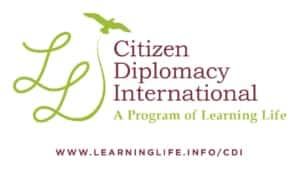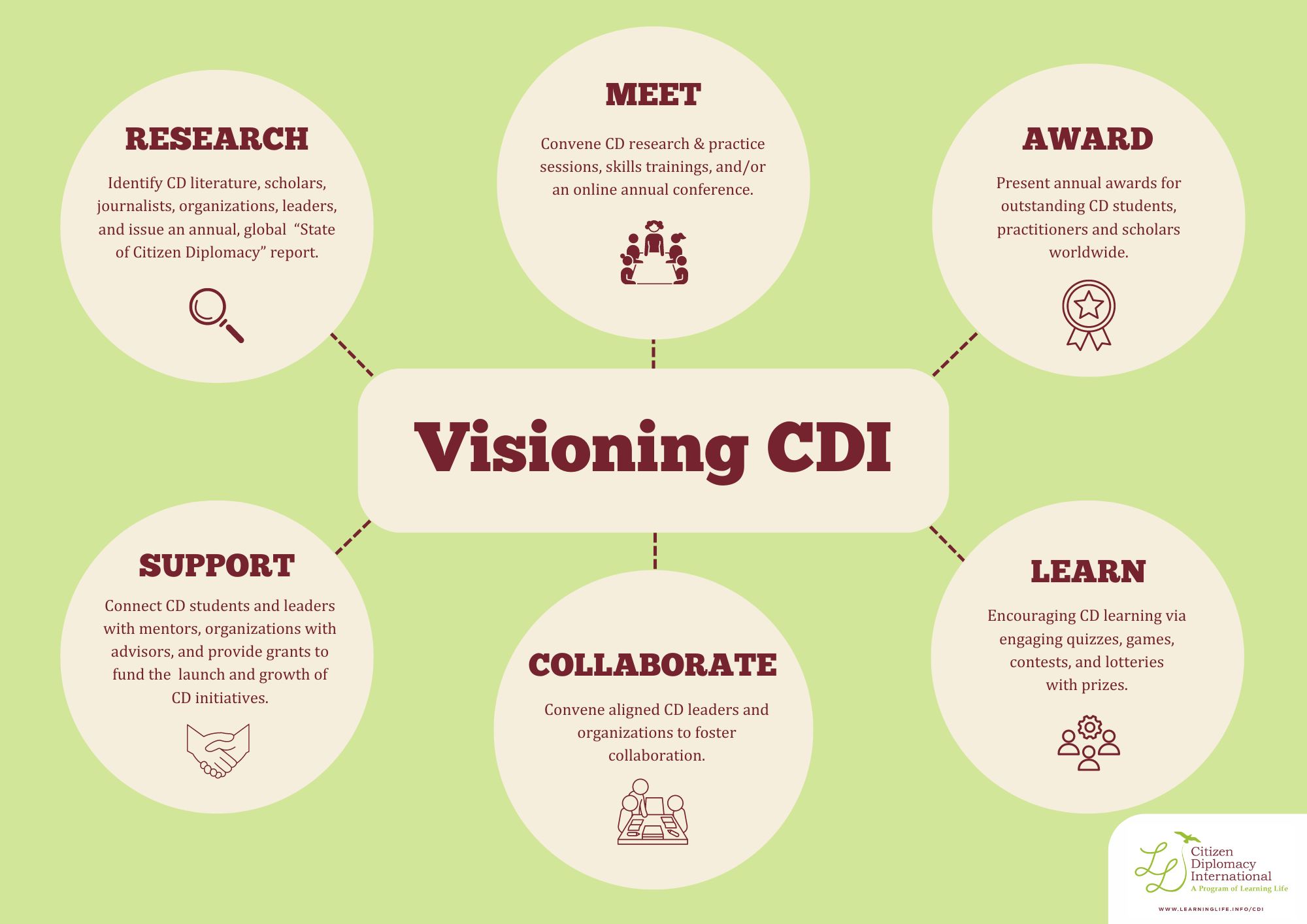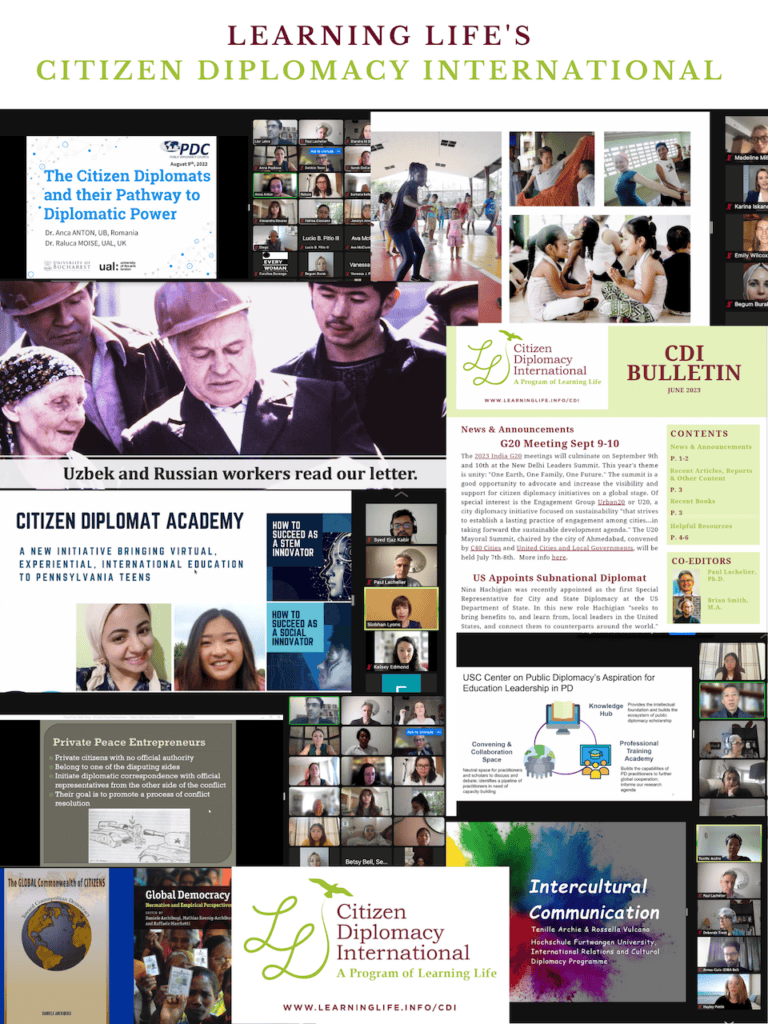Citizen Diplomacy International
Mark your calendar! Learning Life’s four 2024 CDI meeting dates and topics follow below. All meeting times are in Washington DC time, and via Zoom. Contact us at email@learninglife.info to get email notice of CDI’s quarterly meetings, including Zoom link for each meeting.
Wednesday, March 6, 12:00-1:30pm: diaspora diplomacy
Tuesday, June 4, 11:00am-12:30pm: international expositions
Wednesday, September 4, 12:00-1:30pm: digital diplomacy
Tuesday, December 3, 11:00am-12:30pm: careers in citizen diplomacy
About CDI
Interested in international affairs?
Want to learn how citizens of different countries are increasingly talking and collaborating across borders, or help build the global citizen diplomacy sector?
Then, join CDI!
Due to globalization, the internet, rising education levels, and long-term democratization, citizen diplomacy (CD) is likely to grow in the future, becoming a more important part of diplomacy and international affairs. Citizen Diplomacy International (CDI) is a program and network of Learning Life, a Washington DC-based nonprofit building inclusive learning communities in order to widen and deepen participation in democracy and diplomacy. CDI gathers scholars, students, professionals, and observers every three months online via Zoom for 1.5 hours to share news and presentations on CD research and practice, local to global, with an eye to building a vibrant global CD sector for a more participatory, equitable and sustainable world.
View prior meetings here at Learning Life’s Youtube Channel.
Read our quarterly CD Bulletins here.
Access our free lists of CD publications, organizations and writers here.
How You Can Get Involved
(1) Attend CDI Meetings: Anyone worldwide can email subscribe to CDI to learn, network, and/or present CD research or programs. Subscribers get notice of CDI meetings as well as access to our quarterly CDI Bulletin, a growing bibliography of CD-related media (books, journal and news articles, reports, videos, podcasts), and lists of CD experts, journalists and organizations. To subscribe, send Learning Life your email address plus your resume, or a link to your website, Linkedin profile or online work bio to email@learninglife.info.
(2) Present at a CDI Meeting: Scholars, students and practitioners of CD worldwide can present at a CDI quarterly meeting. Learn more below.
(3) Teachers: Connect Your Students: Students worldwide can attend and present at CDI meetings, and access our growing CD bibliography and network. Learn more below.
(4) Connect with CDI on Facebook and Linkedin: CDI’s Facebook group and Linkedin group allow you to network, learn and share CD-related articles, books, events, programs, funding, requests for collaborators, etc.
(5) Sponsor CDI: Want to help build a vibrant global citizen diplomacy sector? Sponsor CDI’s work to network and inform citizen diplomacy scholars, students and practitioners.
For Presenters
All CDI meetings are held online via Zoom, typically occur on Tuesdays, Wednesdays or Thursdays at 11:00am-12:30pm, or 12:00-1:30pm, and feature two or more speakers, who can be citizen diplomacy (CD) scholars, students, or practitioners anywhere in the world. Speakers present on citizen diplomacy history, theory, practice, and/or institutionalization. Each speaker, or speakers from the same group, speak for 15 minutes, often on the same theme (e.g., city, sports, dance or digital diplomacy) followed by 40 minutes of discussion, then the meeting concludes with CD-related announcements. The vast majority of our presenters show slides, and we encourage that.
We typically get 20-40 international attendees per meeting, composed of diplomacy scholars, students, practitioners and interested observers. We then share presentations, photos and video recording of the CDI meeting, along with our quarterly CDI Bulletin to our email list, Facebook group and Linkedin group that collectively reach over 1,500 diplomacy scholars, students, practitioners, and observers worldwide. To view past meetings, click here.
To propose a presentation, send your resume and 1-2 paragraphs explaining what you would like to present to email@learninglife.info. Co-authors are welcome, and two or more geographically diverse speakers who offer two different presentations on the same CD theme are even more welcome since we prefer to focus CDI meetings on a theme.
For Teachers & Students
Students and teachers of international affairs, diplomacy, and related social sciences are encouraged to (a) participate in CDI meetings to network, learn, share their work, (b) in some cases, as the CDI schedule allows, present significant research or practice of CD, (c) share their CD-related publications, events and activities via CDI’s Facebook and Linkedin pages (each page has somewhat different international audiences), and (d) peruse the growing number of CD-related publications (articles, books, reports, podcasts, videos), experts, practitioners and organizations listed at CDI’s online bibliography, accessible to those on our CDI email list.
Students can engage with CDI, among other ways, via:
- a course requirement, such as a research paper or field experience
- extra credit for a course or major/concentration
- a major/concentration thesis, capstone or culminating experience
- an extracurricular independent study, or student club
Teachers who wish to provide their students with the opportunity to engage in CDI through a course paper or extra credit can add and adapt the following template text in the appropriate course syllabus:
Students can [gain X% course extra credit OR write a short field experience reflection] by attending at least one meeting of Citizen Diplomacy International (CDI), a network that brings together scholars, students, diplomacy professionals, and citizen diplomacy (CD) practitioners every three months online via Zoom for 1.5 hours to share news, research and presentations on CD developments, local to global. For the extra credit, students must write a two-page, single-spaced reflection in answer to these questions: How was the meeting structured? Who presented on what topics, and what were the presenters’ key points, in brief? How do the presenters’ points, and the ensuing discussion, confirm, extend, or challenge what you have learned in this course (e.g., theories, cases)?
By attending CDI meetings, and exploring our CD bibliography, researchers, teachers and students can pursue any number of questions about citizen diplomacy, such as:
History & Trends: What is citizen diplomacy (CD)? What are historical examples of CD successes and failures, and what explains their success or failure? What forms does or has CD taken in particular countries, regions, or across the world? Why and how is CD growing in particular countries, regions, or across the world? What trends in diplomacy and society have implications for CD? How will technological developments, such as the developing online “metaverse,” influence CD practice?
Identities & Motivations: What kinds of people (demographics, ideologies) identify as citizen diplomats? Why do some people get involved in CD and others do not? How can people be effectively motivated and trained to become citizen diplomats, and how can stakeholders be motivated to invest in CD? Can crises, like climate change, and trends, like growth in tourism, be harnessed to inspire CD practice and research?
Quantity & Quality: What is the quantity and quality of past and present CD practice? Quantity could be measured by numbers of participants, countries and resources involved on a continuum from the smallest to the largest scale of CD operation. Quality could be measured on a continuum from the most superficial to the deepest CD instances (e.g., single, momentary interactions online to the most institutionalized, ongoing, in-person collaborations). In either case, continua can be filled with historical or hypothetical CD cases to convey the range of past practices or future possibilities.
Legitimacy: What is legitimate CD? Who should decide, using what standards? How can citizen diplomats determine the legitimacy of particular issues or organizations? What are the ethical obligations of citizen diplomats, and how can these obligations be enforced?
Relationships & Collaborations: How do citizen diplomats interact and, in some cases, collaborate with official diplomats as well as other institutional players, especially during significant world events or periods of conflict? How do official diplomats view CD? How is CD viewed in different countries? How do stakeholders in countries with more state-centered, authoritarian and/or collectivist cultures perceive and practice CD? How are businesses using CD, and for what purposes? How can citizen diplomats in cities and towns worldwide be made more visible to governments, transnational businesses, nonprofits and each other to facilitate cooperation and leverage their connections, knowledge and skills?
Effectiveness & Training: What are the qualities of effective citizen diplomats? What kinds of knowledge, skills, connections, attitudes and other resources matter most? How can people be trained to develop these qualities and resources? How can citizen diplomats “agree on how to disagree,” and also avoid being manipulated to do the bidding of domestic or foreign governments?
Agency: Who controls or drives the CD, to what extent, and in what ways, from creation and planning, to implementation, to evaluation and reporting? How is the CD funded, and how does that funding affect “agency,” understood as a continuum from the most “bottom up” (driven by the least advantaged citizens) to most “top down” (driven by the most advantaged citizens).
Impact, Success & Benefits: What are the strengths and weakness of CD? How do CD projects and programs impact participants – from students, to farmers, to activists and nuclear scientists – as well as non-participants? How should success be measured? Is there a way to measure the cost of the absence of CD, perhaps by comparing similar conditions with and without CD? Is there a way to measure the “multiplier effect” or impact of CD on non-participants? Who currently benefits from CD?
The above questions are adapted from “Citizen Diplomacy,” a chapter by Drs. Paul Lachelier and Sherry Mueller, in the book, Research Agenda for Public Diplomacy, to be published in 2023.




